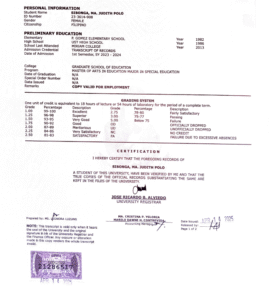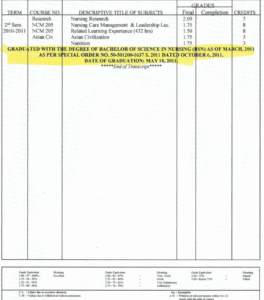

Whenever I am training a junior level evaluator on the education system of the Philippines, I stress the importance of locating the Special Order (S.O.) Number. When evaluating a post-secondary degree or diploma from the Philippines, you may have come across the Special Order (S.O.) Number. What exactly is it, and why is it such an important detail in the academic documents being evaluated?
What is a Special-Order Number?
The Special Order (S.O.) Number is a unique identifier issued by the Commission on Higher Education (CHED) in the Philippines. It serves as official proof that a student’s post-secondary degree or diploma program was recognized and authorized by the Philippine government. Essentially, it acts as a seal of legitimacy, ensuring that the educational program meets national standards and was offered by a duly recognized institution.
Why was the S.O. Number Introduced?
CHED implemented the S.O. system to uphold quality assurance in higher education. By assigning an S.O. Number to each graduate, the government can confirm that the completed program was not only authorized but also met curriculum standards. It also helps prevent diploma mills and unregulated programs from operating under the radar.
Where is the S.O. Number Found?
You can typically find the S.O. Number printed on the following:
• Transcript of Records
• Diploma
• or in an attached CHED Certification document
It usually appears as:
S.O. No. [Year]-[Serial Number], e.g., S.O. No. 2018-12345
Is an S.O. Number Required for International Credential Evaluation?
Yes—the S.O. Number is required for verification purposes. Without it, the legitimacy of the qualification may be questioned and delay the evaluation process.
What if the institution doesn’t use an S.O. Number?
In 2016, CHED introduced CMO No. 11, Series of 2017, which allowed autonomous and deregulated institutions to issue degrees without applying for individual S.O. Numbers. If the institution has this status, an S.O. Number will not appear on the records, but the institution should provide documentation confirming its exemption from the S.O. requirement.
How can an S.O. Number be obtained or verified?
Advise the applicant whose credentials are under review for evaluation or admissions to do the following:
• Contact the institution’s registrar
• Request a certification from CHED
• Or check the transcript and diploma for the printed number
The S.O. Number may seem like a small detail, but it plays a crucial role in ensuring the recognition of the academic credentials.

Alan Saidi
Senior Vice-President/COO/CTO

The Academic Credentials Evaluation Institute, Inc. (ACEI), was founded in 1994 and is based in Los Angeles, CA, USA. ACEI is a full-service company providing complete and integrated services in the areas of international education research, credential evaluation, and translation. https://acei-global.org/
